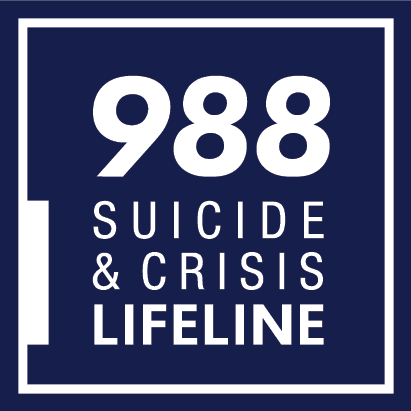Answers To Frequently-Asked Questions
Call 988
Tap to call
Learn More
Frequently-Asked Questions
Calling the 988 Lifeline connects you with someone who can discuss your situation and empower you to help your friend, family member, or loved one. The following are common questions we get asked about the program and what to expect when you call.
What is 988?
A national hotline offering one-on-one support for mental health, suicide, and substance use-related problems for anyone 24/7. No matter where you are in the United States, you can call or text the number 988 or chat online at 988lifeline.org and connect with a skilled, compassionate crisis counselor.
Do I have to be suicidal to call 988?
People reach out to the 988 Lifeline for many reasons beyond suicide, including drug or alcohol use, emotional distress, anxiety, depression, mental illness, loneliness, trauma, bullying, stress, relationship troubles, and just needing someone to talk with.
Can I call for or about someone else?
Yes, the 988 crisis counselors offer compassionate support and helpful resources to family members, friends, caregivers, and advocates who are concerned about someone else.
How is 988 different from 911?
988 offers emotional and mental health support with limited involvement from law enforcement, only stepping in where there’s an immediate threat to physical safety. The 988 Lifeline provides a coordinated response focused on stabilizing individuals and connecting them to care in the least restrictive way possible. In most cases, trained counselors help de-escalate the situation without the need for law enforcement involvement.
If I call 988, will first responders – like the police or EMS – be dispatched?
If you or the person you are calling about is in immediate physical danger, the 988 counselor may contact 911 to dispatch emergency services. In certain situations, it may be more appropriate to call 911 directly – such as:
-
- A suicide attempt in progress.
- A person has a specific suicide or self-harm plan and intends to act on it imminently and has the means to carry it out.
- A person that is believed to be experiencing a drug overdose.
- A person is experiencing physical symptoms – like chest pain or difficulty breathing – that may be caused by a panic attach or could indicate a serious medical emergency.
Will I be hospitalized if I call 988?
Crisis counselors work directly with individuals in distress, offering support in the least restrictive way possible. In fact, most situations are resolved through the call, text, or chat with a 988 counselor – without the need for further immediate intervention. For those who need additional support, a mobile crisis can often respond and provide help without the need for hospitalization.
Does the 988 Lifeline trace the location of people that call, text, or chat?
When you contact the 988 Lifeline, the crisis counselor will see your phone number if you call or your IP address if you use chat. Other than that, they won’t know your identity or exact location – and you’re not required to share personal information to receive help. If a counselor does ask for information, it’s only to help save lives, connect you to ongoing support, or evaluate the effectiveness of 988 services. In rare cases where there’s an immediate threat to life, the counselor may contact 911. At that point, 911 may work with internet or phone service providers to try to pinpoint your exact location, as 988 itself does not have access to that information.
What is mental health?
Mental health refers to your overall sense of emotional and psychological well-being, and describes how your thoughts, emotions, and behaviors influence your abilities to handle stress, form relationships with others, and make decisions.
What causes mental health issues?
Many factors can affect your sense of well-being, including stressful situations, emotional loss and grief, inherited genetic traits, or even an imbalance in your brain chemistry. Many mental health issues develop over time and may go undetected until a crisis situation occurs.
What do I do if I am suffering from a mental health issue?
Try talking to a loved one such as a friend or family member, or seek out professional help to discuss your thoughts and emotions. If you’re feeling desperate, lost, or have no one else to turn to, you can always call 988 to connect immediately with someone who will listen to you without judgment and help you sort things out.
What can I do to help my loved one?
Try talking to them in a calm, non-judgmental way, be supportive and encourage them to seek professional help, and check in with them often to make sure things are not getting worse.
How do I comfort someone in crisis?
It is important to listen openly, express understanding and concern, and offer to help them look for resources and/or professional help. If you fear your loved one may hurt themselves or someone else, then call 988 immediately for help.
What are the signs of suicidal behavior?
Is it safe to talk to someone about suicide?
Yes. There is a misconception that discussing suicide with a loved one who is struggling might “put the thought into their head,” but doing so actually creates an opportunity for communication and decreases the chance that your loved one will make an impulsive decision to hurt themselves.
How can the 988 Lifeline help?
In an emergency situation, we can talk directly to your loved one experiencing a mental health crisis, or we can talk you through how to assist someone experiencing suicidal thoughts. 988 is part of a continuum of mental health care that includes sharing resources that could include a
mental health mobile crisis and crisis stabilization units. We can refer you to other resources that provide specific, long-term help to those in need.





